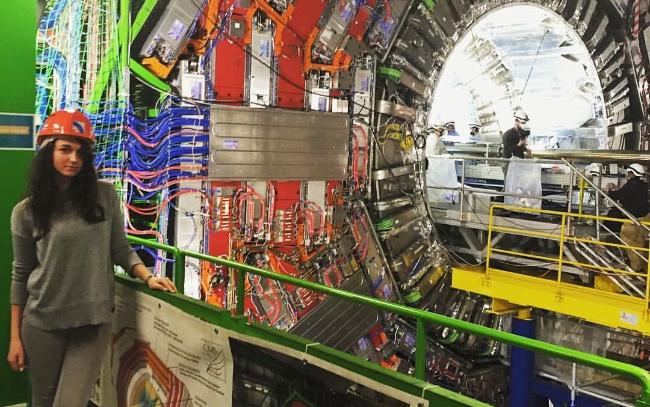Milena Vujanovic: “As somebody who loves learning, the idea of trying to understand how nature works on the fundamental level simply captivated me.”

“At the age of 12, a new subject was introduced to me at school: Physics. I had never heard or seen this word before so I asked my father what this subject was about. He told me: ‘Ah, this is not something for you. It won’t interest you. Don’t worry about it.’ Now, 13 years later, my life is all about physics. Antimatter physics, to be more precise.”
Milena Vujanovic is a Marie Curie Fellow at the Cockcroft Institute. She joined the QUASAR Group as part of the European Union funded project called AVA. This program focuses on antimatter research: the development of antimatter facilities and corresponding experiments.
Her choice to study physics was not an obvious one, after all, her father had told her she would not like it, but everything changed for Milena when she turned sixteen.
“I was reading newspapers and in one article, it said how by increasing the energy of a proton you can increase its mass. I couldn’t believe what I had read! It made no sense to me. I was in such disbelieve that newspapers would spread such obvious lies that I decided to find the proof that it was wrong! Little did I know back then that I was up against one of the most important equations in physics.”
Milena’s determination in wanting to prove the newspaper wrong had a lasting effect on her life: She not only found out that she was wrong, but also discovered her passion for physics.
“I feel like it happened over night. As somebody who loves learning, the idea of trying to understand how nature works on the fundamental level simply captivated me. At the time, I was fascinated with philosophy, and the more I learned about physics, the more I saw the connection between the two. This realisation and the need to find the answers to the big questions has kept me motivated over the years and eventually led me to studying antimatter and the beginning of the Universe.”
Milena spent over a year at CERN as a technical student, doing fundamental research in the antimatter field. Today, as part of the QUASAR group, she is working towards her PhD at the University of Liverpool. As an AVA fellow, she will be working on beam diagnostics and develop “a DMD based Beam Halo and emittance monitor”.
“Now, it is up to our generation to live up to the legacy of amazing female scientists, and leave no doubt that girls can do science too.”
“I never expected to be part of such an amazing group. Coming from a place where the idea of a girl doing research is unusual, I had to deal with many unpleasant situations. I had no support when I decided to study physics. No matter how much I worked or what I achieved, I was constantly told I cannot be a physicist. Many times, I wanted to give up and do something more “girl-like”. In those moments, I would find inspiration in amazing female scientists like Emmy Noether or Marie Curie, who no matter what the world told them, stood up for themselves and did what they were passionate about. Their actions not only brought outstanding discoveries but they paved the way to science and research for all girls today. Now, it is up our generation to live up to their legacy and leave no doubt that girls can do science too.”